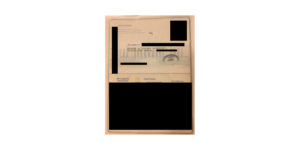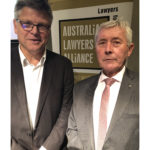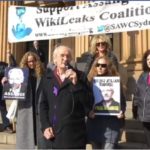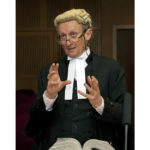“You Have a Right to Know”: An Interview With Witness J

The case involves Commonwealth orders that suppress the publishing of the identification of a former Australian intelligence official or the details of the charges that led to their imprisonment. Indeed, the details of the orders themselves are classified.
Dubbed Witness J, the ex-military intelligence officer was tried in secret in 2018. He pleaded guilty to the undisclosed charges and was sentenced in early 2019 to serve time in Canberra’s Alexander Maconochie Centre (AMC), where he’d already been remanded since May 2018.
Presiding over the case, ACT Supreme Court Justice John Burns explained that the “sensitive nature of the material to be exposed in the proceeding, and the grave harm that could occur if the material became public, outweighed the desirability” for the proceedings to be made open.
But, as the scant details of the case came to light in mid-November, members of the legal fraternity vented their dismay around our nation holding secret trials. And it prompted former NSW Supreme Court Justice Anthony Whealy to question whether Australia is becoming a “totalitarian state”.
A therapeutic approach
The only reason the secret case came to wider public attention was that Witness J recently entered into legal proceedings to challenge the right of prison authorities to inform the AFP about a manuscript that he’d written, and the related sanctions that were subsequently applied.
On the advice of a prison mental health nurse, Witness J produced two novel length manuscripts whilst inside. One was a memoir about his time in prison, which made no reference to his former employment circumstances or the reasons behind his detention.
Then AMC general manager Ian Robb read the manuscript, and thought it was fine. However, his replacement, Corinne Justason, became concerned about the document, after Witness J requested a visit in early 2019 from Canberra author Robert Macklin in regard to the writing.
And Ms Justason’s disclosure led the federal police to raid Witness J’s brother’s house – as the document had been emailed to him – as well as the inmate’s cell. And Witness J was then barred from using email for a two month period following the raids.
The Twitterverse
As a number of media outlets have acknowledged, an individual purporting to be Witness J has turned up on Twitter over recent months. His profile declares that he was imprisoned “after asking for mental health support three times and falling through the floor”.
Recently, we reached out to the individual behind the Twitter profile and asked if he would like to share any of his story, whilst, of course, continuing to abide by the secret orders that restrict what can be discussed.
Sydney Criminal Lawyers spoke to Witness J about the details he’s able to raise in the public arena and what his opinion is on secretive trials being conducted in Australia.
Firstly, you’re a former senior military intelligence officer who worked for an Australian agency. You’d served your country in various locations around the globe.
A few years back, you’d requested mental health assistance on a number of occasions. But, it was not forthcoming. And following accusations about your having become a compromising risk, you made an internal complaint. And from there, charges were laid against you.
What I’ve described here is all in the public arena. What are you permitted to add to these circumstances around your case?
There is information which I cannot share for legal reasons, which I would like to. And there is information I can share, but am choosing not to at this time.
However, what I can and want to share relates primarily to the excessive focus on my military background. I was once an army intelligence officer, but my uniformed service concluded years ago, and I departed as a junior officer.
More recently, I was a civilian intelligence official in the Australian intelligence community (AIC). And while I worked alongside Australian special forces in the Middle East, I did so as a civilian. Nothing that has happened to me relates to the military in any capacity. This is an important distinction.
My hope is that the Australian public question what the AIC is doing to protect and care for its staff, noting the difficult and arduous work that goes on to keep Australia prosperous and safe.
In many ways, I feel lucky in that I’ve survived this ordeal with my life. I am not seeking to dissuade the Australian public that my disclosures were serious – they were. I am not attempting to minimise my culpability and the responsibility that I must own for my actions.
My life has been destroyed. And while I have paid for my mistakes with 455 days in prison, the continuing anonymity of my former employer and the accountability of their actions is alarming to me.
I do not feel the Australian public is sufficiently informed to discuss this important matter. And I also have no confidence that the inspector-general of Intelligence and Security’s investigation into this matter will produce any effective outcome and/or change.
The AMC prison authorities didn’t know why you were imprisoned there, but they were made aware that they should keep a keen eye on you.
What can you say about the way the Australian justice system has treated you? And what would you say the experience has taught you about the importance of transparency around such matters?
People who break the law are open to prosecution regardless of their status or service to the nation. I use the disclaimer “open”, as it’s clear the law is not evenly applied in similar cases, and that legal training, affluence and/or personal influence are critical factors.
Queensland premier Annastacia Palaszczuk’s diaries recently disclosed the identity of an ASIO officer. And I understand the Australian federal police did not charge her or anyone else in this matter.
So, the question becomes: does my fifteen years of arduous service entitle me to leniency? Or perhaps to have the law applied differently as it so clearly has been in Ms Palaszczuk’s situation. This is where I, as a legal layman, fail to understand how the law is applied to people differently.
It is fair to say I have very little confidence in how I was treated. I was disappeared from my life and my family by a legal system that tends to hold itself morally high, and point to draconian and authoritarian systems in other countries.
Australia now arrests, tries and imprisons its most committed citizens, when they are in temporal mental turmoil and have been denied help.
It’s not good enough to simply make the case that we do it better than other countries. It’s akin to a partner slapping his spouse across the face, and then pointing across the street and reminding them they’re lucky they don’t receive more vicious and regular beatings.
Thus, Australia stands to slide into continued authoritarianism and hypocrisy while pointing out more egregious examples. As the esteemed Julian Burnside QC recently postulated: “is ours a legal system, or a justice system? The definition matters”.
I feel lucky to have been born in Australia, and while I’m deeply proud of my service to this nation, I now sincerely regret it.
I wish I had pursued a career that left me financially better positioned and with my mental health more intact: one without the lying and deceit and broken relationships, as I moved around the world believing in a government that did the right thing.
This country has spat me out and continues to negatively impact my personal life in a way that makes me question if anyone competent is steering the ship.
As someone who is a citizen to two other countries, I am seriously considering renouncing my Australian citizenship under section 33 of the Australian Citizenship Act 2007, noting the Migration Act 1958 has provisions for ex-citizen visas – and thus continued residency.
Though, I would emigrate as soon as able and make my life in a country that doesn’t think so little of me.
You were released in August this year. The only reason your secret case has come to light is that you challenged the right of prison authorities to inform the AFP about a manuscript you’d produced about your time in prison.
The judge presiding over your legal challenge eventually dismissed your claims. How do you feel about the outcome of this case? And indeed, your treatment whilst behind bars?
As succinctly as I can manage, I am convinced that the Australian legal system is accessible to those with legal training and/or money only.
I have neither. And while I carefully made my case on the specific points of the relevant ACT administrative law act, to the full limits of my faculties, I still lost.
When I was delivered a phonebook-sized binder of case law to my cell one day – I had no access to AustLII or other legal databases then – courtesy of the defendant’s senior barrister who had been appointed by the Australian government solicitor, I knew my sound moral and evidence-based position was in jeopardy.
Still, I was, and remain, flabbergasted at the decision to dismiss my recent civil case. The legal fraternity will soon have access to my originating application and supporting evidence. And indeed, quite rightly, the defendant’s submissions.
And while they’ll cringe at this layman’s attempts to muddle his way towards the light of justice, I hope they’ll also reflect on how utterly inaccessible justice can be for those without money or the right degree.
The only thing I clearly brought to bear were the facts, and the evidence to support them. This was not enough, and thus why I am now a pessimist.
Regarding my incarceration, I was neglected for the first month of my stay, and then mostly well treated – though sometimes poorly – for the remaining fourteen months of my sentence.
I was placed in solitary confinement for the first month of the detention. And it took a compassionate and able psychiatrist to demand my movement into more suitable accommodation for the sake of my safety.
I was effectively buried during my time, and then placed in the sexual offenders’ wing with thirty six men that included some of the most evil and depraved examples of humanity I have yet seen in my life.
I would note that I compare these predators to the Taliban and later Islamic State alumni I have personally interacted with during my government service.
I was a novelty. And being placed in strict protection with paedophiles and rapists – some of whom are former senior public servants, priests, professors, senior UN officers and other competent men – combined to create an odd situation that I only became fulsomely aware of as others told me stories around the rest of the prison.
I was never detained in the dreaded “blocks” – that is, after my month in solitary confinement – but I lived in a cottage-style cell and my door was never locked.
We ordered food from a supermarket each week and cooked for ourselves, and spent the day wandering across an AFL sized oval of gardens, chairs, sporting equipment and other recreational facilities.
My personal confidence and prior service – particularly in the military – made me immune to the pettiness and other conflict one finds in a prison, though I had a few times to stand eyeball to eyeball with others and assert myself.
Drugs were ever present, but far more discreet where I was. And I confess to having entirely no interest in the pursuit of this avenue of escape.
I did own a number of mobile phones, which were both expensive and a danger to be caught with. We blatantly bought them from the guards. And I have no problem admitting this given the genuinely amazing and wide penetration of contraband into the prison.
Given my unique situation, making friends with the guards, who, with the greatest respect, were often bored and of limited difficulty to befriend, allowed me to help soften the difficulties of prison life.
My memoir explores this more fulsomely, but the guards have a vested interest in keeping detainees happy, and mobile phones are the easiest method to do this.
If you wonder why these phones aren’t turning up more consistently in searches, I would merely submit that one must question who conducts the searches.
Former NSW Supreme Court Justice Anthony Whealy has asserted that your secret prosecution and imprisonment displays a “complete abandonment of open justice”. And he further questions whether this country is heading down the road to becoming a totalitarian state.
There are other well-known cases – that of Witness K and former military lawyer David McBride – that although are not shrouded in the complete secrecy of your case, will entail proceedings being carried out behind closed doors.
What’s your take on the concerns the former Supreme Court Justice raised about the direction this country is heading in?
I do not have formal legal training – only perhaps a dipped toe during a postgraduate degree – and thus, cannot answer in a way that this question demands.
I can answer as an everyday informed Australian, and particularly one who understands implicitly what the national security risks and provisions are in my particular matter.
That established, I am convinced that the abuse of national security provisions is a clear indictment on a country that seeks to minimise embarrassment and avoid accountability, rather than genuinely seek to protect this nation’s secrets.
There are issues related to my case that should not be made public, but the level of suppression should give alarm to those with an informed knowledge of what justice means.
As only one of many examples, my own barrister, the distinguished Mr Kieran Ginges, did not know my own real name throughout my matter – and, I would note for completeness, does still not.
This is an outrageous, and frankly scary, descent into authoritarianism that can only be explained through the lens of “the legislation allows it”, rather than a sound and effective justification for why we’re doing it. This country must do better.
Many esteemed Australians presently and previously involved in the Australian legal system have reached out to me and made their concerns about the unprecedented secrecy clear.
I have been humbled by this, and while I take no pleasure in being the test case for where our newly defined “limited democracy” is heading, I promise I will stand up to the limits of the legal restrictions on me to make this outrageous case known to the public and legal fraternity.
Where I am hobbled – and I most certainly am – I must trust in those who still have a voice to tell my story: the advocates, journalists – who still respect the ethos of responsibly reporting the facts – and, not least, my own family.
What of the direction this country is heading in? I was disappeared from my family, my life, and my country. I am evaluating my desire to remain an Australian citizen as we speak.
And lastly, what would you like to convey to the Australian public about your situation, as well as the system they’re living under?
You have a right to know.







